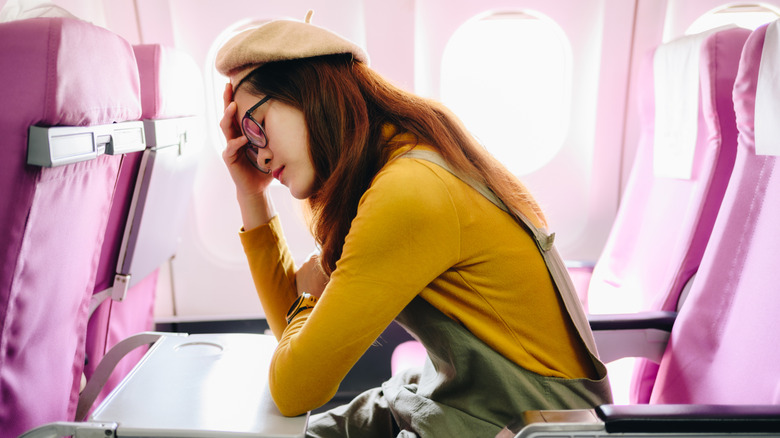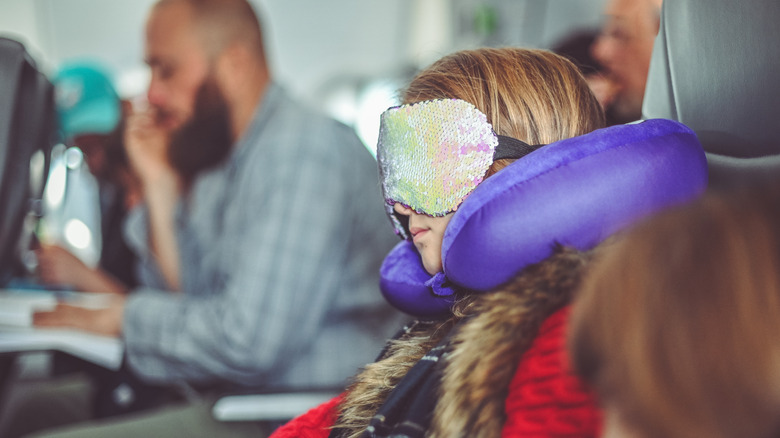Jetlag Is Proven To Be Worse When You Fly In This Direction, According To Science
We may receive a commission on purchases made from links.
Flying is a fast and convenient way to get to destinations, whether it's traveling to explore the world, visiting loved ones, or for a business trip, but it doesn't come without its burdens. That's especially true for people who experience jetlag, that feeling that your biological clock is just completely off, as it is one of the main drawbacks of long-haul flights. It disrupts sleep, mood, and overall well-being, and it can be quite frustrating to deal with. Unfortunately, it turns out that traveling long distances in a certain direction may actually cause jetlag — and even make it more severe.
Research shows that the direction of travel plays a role on how severely jetlag affects travelers. Flying eastwards is more likely to cause severe jetlag than flying westward, as the body's internal clock struggles more to adjust to moving to a later time zone than to an earlier time zone. While there's not much you can do regarding the direction of travel, understanding why jetlag occurs is beneficial to adjust certain factors that may help to get around the severity of it and keep the symptoms to a minimum.
How much worse is eastward jetlag?
The circadian rhythm or "body clock", located in part of the brain called the SCN (suprachiasmatic nucleus), is the body's natural way of controlling physiological processes. These include sleep-wake cycles, alertness levels, and how our body reacts to light and dark. These external cues help synchronize our body's internal clock with the outside world. For instance, morning sunlight gives a signal to the body that it's time to wake up while darkness suggests that it's time to get ready to sleep.
When the circadian rhythm is disrupted by jetlag — or working night shifts, for example — the body clock is no longer aligned with the external time, making it harder to stay alert during the day and more difficult to fall asleep at night, resulting in an overall foggy-headed feeling.
Scientists at the University of Maryland created a mathematical model that recreates a simplified version of the circadian clock's activities to study the impact of jetlag and how long it would take the body to adjust. The results showed that the SCN cells, responsible for keeping track of the circadian rhythm, adjusted slower when traveling eastwards than westwards, making it harder to recover from jetlag. It also revealed that it's easier for the body to adjust to westward travel, where the day is extended and sleep is delayed, as opposed to eastward travel, where the day is shortened and an earlier bedtime is forced.
How severe is the jetlag difference?
So, how much worse is jetlag when flying east? Significantly worse! Surprisingly, a 9-hour eastward flight can require several extra days of adjusting and recovering from jetlag compared to traveling the same distance westward. Researchers found that a 9-hour eastward shift is the toughest on the body's internal clock and requires the most recovery time for travelers, even more than the body would require to adjust to a 12-hour shift in either direction. This means that a shorter trip east can cause worse jetlag than a longer trip east or west.
For those crossing several time zones while flying, planning ahead and gradually shifting your sleep schedule before traveling could prove to be the simple jetlag cure you need. The other alternative to overcome jetlag is booking a flight time that aligns with your usual bedtime to ease the transition from one time zone to another. Don't forget to pack a comfortable neck pillow such as this SAIREIDER Travel Memory Foam Neck pillow to help you get the much needed rest on your flight. Remember to stay hydrated and think twice before ordering common beverages on a plane such as coffee as it can worsen symptoms of jetlag.


